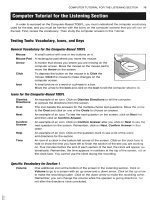Feeling good 100 ways to feel better every day phần 9 pptx
Bạn đang xem bản rút gọn của tài liệu. Xem và tải ngay bản đầy đủ của tài liệu tại đây (60.91 KB, 11 trang )
Talk about smoking with your children.
The best way to keep your child from smoking is to
not be a smoker yourself. The next best thing you can
do is to talk about the dangers of tobacco with your
child. Here are two tips from the Centers for Disease
Control and Prevention:
• Start talking about tobacco use when your child is 5
or 6 years old and continue talking about it through
the high school years. Talk about the risks of tobacco
use. If friends or relatives died from tobacco-related
illnesses, talk about this as well.
• Know if your child’s friends use tobacco. Talk about
ways to refuse tobacco.
Parents who quit smoking when their children are young
reduce the chances of their kids becoming teen smokers.
–Fred Hutchinson Cancer Research Center
92
Meditate.
Meditation is a way to calm both your body and your
mind—it helps you slow down, clear your mind of
clutter, and feel calm. Take a few minutes and try this
simple meditation exercise:
Sit in a comfortable position in a quiet room, either
on a chair or cross-legged on the floor. Close your
eyes. Focus your attention on a silent thought, word,
or phrase. If your attention wanders, gently redirect it
back. Concentrate on the sensation of each breath as
you inhale and exhale.
93
Practice deep breathing.
Focusing on your breathing and practicing deep
breathing exercises help relieve tension and stress.
Here is a simple exercise to do every day for a
few minutes:
Stand or sit in a comfortable position, with good
posture so that your stomach is not compressed. Put
one hand over your belly button. Now breathe in
slowly and deeply through your nose, letting your
stomach expand as much as possible. Hold your breath
for a few seconds, then exhale slowly through your
mouth. You may need to make a conscious effort to
relax your stomach muscles as you breathe in. When
you’ve relaxed your stomach muscles and this deep
breathing is working, your hand on your stomach will
rise and fall about an inch with each breath. When
your lungs are empty, start again with another deep
breath. After just three or four breaths, you should feel
the calming effect through your whole body.
94
Make time for personal relationships.
People with close relationships feel good, suffer less
anxiety and depression, and are more fulfilled through
old age. But personal relationships take some effort.
• Make time for friendship, no matter how busy you
are. Schedule time with friends into your calendar.
• Don’t let a misunderstanding get in the way of a great
friendship. Be willing to talk openly. Communication
is key to lasting friendships.
• Make time for family and extended family. Plan visits
with those who live near and far.
• Keep on making new friends throughout your life.
“The happiest people surround themselves with family and
friends, don’t care about keeping up with the Joneses
next door, lose themselves in daily activities and, most
importantly, forgive easily.”
–Martin E. P. Seligman, Authentic Happiness
95
Connect in person when you can.
In today’s fast-paced digital world, face-to-face time can
easily be replaced by phone calls, e-mails, and text
messages. But human connection is an important part
of overall emotional well-being. Make conscious efforts
to connect in person with the people in your life.
• Take a break from calling or e-mailing co-workers to
talk in person.
• Read to your children and have talks before bedtime.
• Plan to visit extended family when you’ll have time to
enjoy each other’s company.
• Go on a date with your partner or spouse so you have
time to talk and be together. Reconnecting with each
other will make you both feel good.
96
Schedule time for fun into your calendar.
When you’re busy and your schedule is packed, you
can forget to schedule time for fun into your calendar.
Make it a habit to look ahead and block out regular
time for family dinners, trips to the park, visits with
friends, seeing a funny movie, and doing fun things
alone and with others. Having fun keeps you healthy,
happy, and rejuvenated.
97
98
Pay attention to what’s important.
It’s easy to lose sight of what’s important when you’re
working hard and juggling a million things. To stay
focused on the things that matter, you need to make
time for reflection—time for thinking about your life,
values, priorities, and where you are going. Are you
taking care of your physical health? Are you happy?
Do you laugh enough? How are your relationships
with the people you care about?
As you ask yourself questions and reflect on what’s
important, you’ll discover what changes you need to
make so that your life feels more balanced and so you
have time for the important things.
99
Talk yourself into feeling good.
Optimism is a skill most of us can learn. It just takes
practice. Here are some things to tell yourself as you
practice feeling good:
• “This is an opportunity to grow, learn, practice
patience.” Tell yourself this when you’re recovering
from everyday hassles like a flat tire, a bad day at
work, or a missed flight.
• “Today is great because (fill in the blank).”
• “I feel better.” Most of the time, if you tell yourself
you feel better, you do feel better.
“If you think the worst and get the worst, you suffer
twice. If you think the best and get the worst, you only
suffer once.”
–humorist Loretta LaRoche
Realize that it’s never too late.
It’s never too late to
• spend more time with your children
• learn a new skill
• get in shape
• go back to school
• start a diet
• be there for a friend
• start exercising
• go somewhere you’ve never been
• tell your partner or parent or child or a friend,
“I love you”
100
Get started on your feeling good plan.
Now you’re ready to put the tips and ideas you’ve read
in this booklet to use. Write down here the tips you’d
like to work on and the steps you could take to
achieve your goals. For example, “Tip 23. Get in the
sleep mood. Steps I’ll take: Turn off the TV an hour
before bedtime. Use that time to take a bath and read
a good magazine.”
As you get going on your feeling good plan, try new
tips, change old habits, and before you know it, you’ll
be feeling better!









